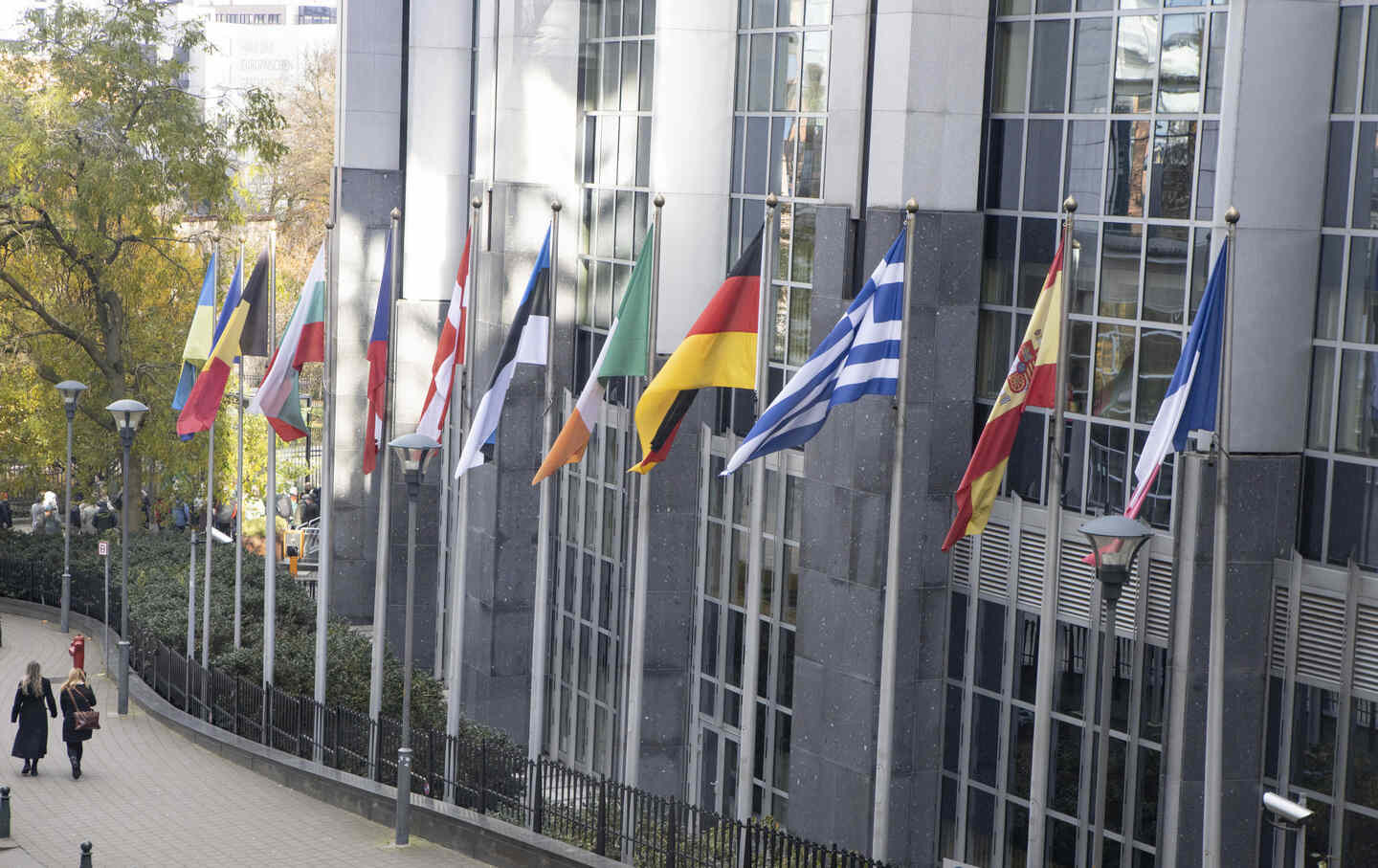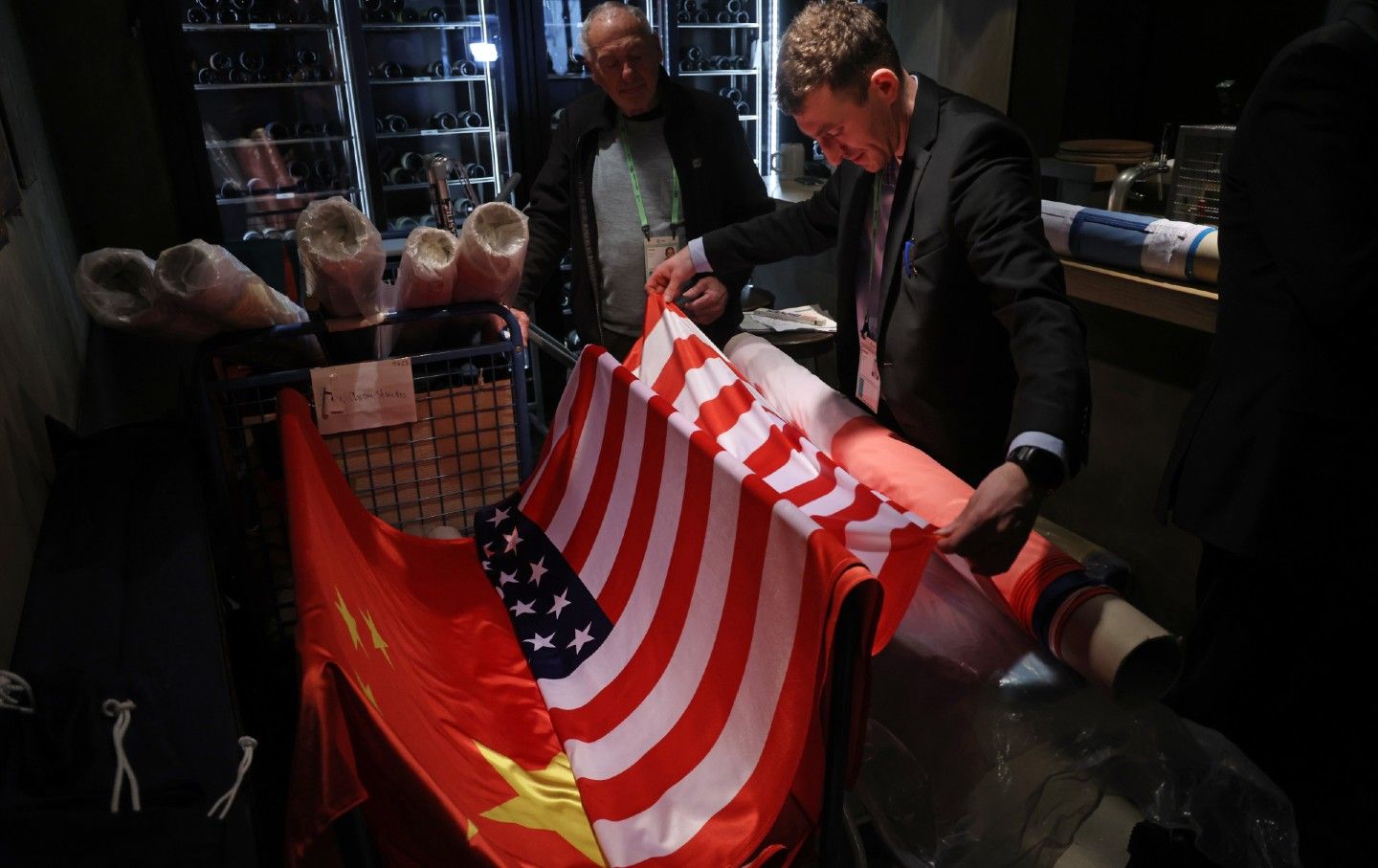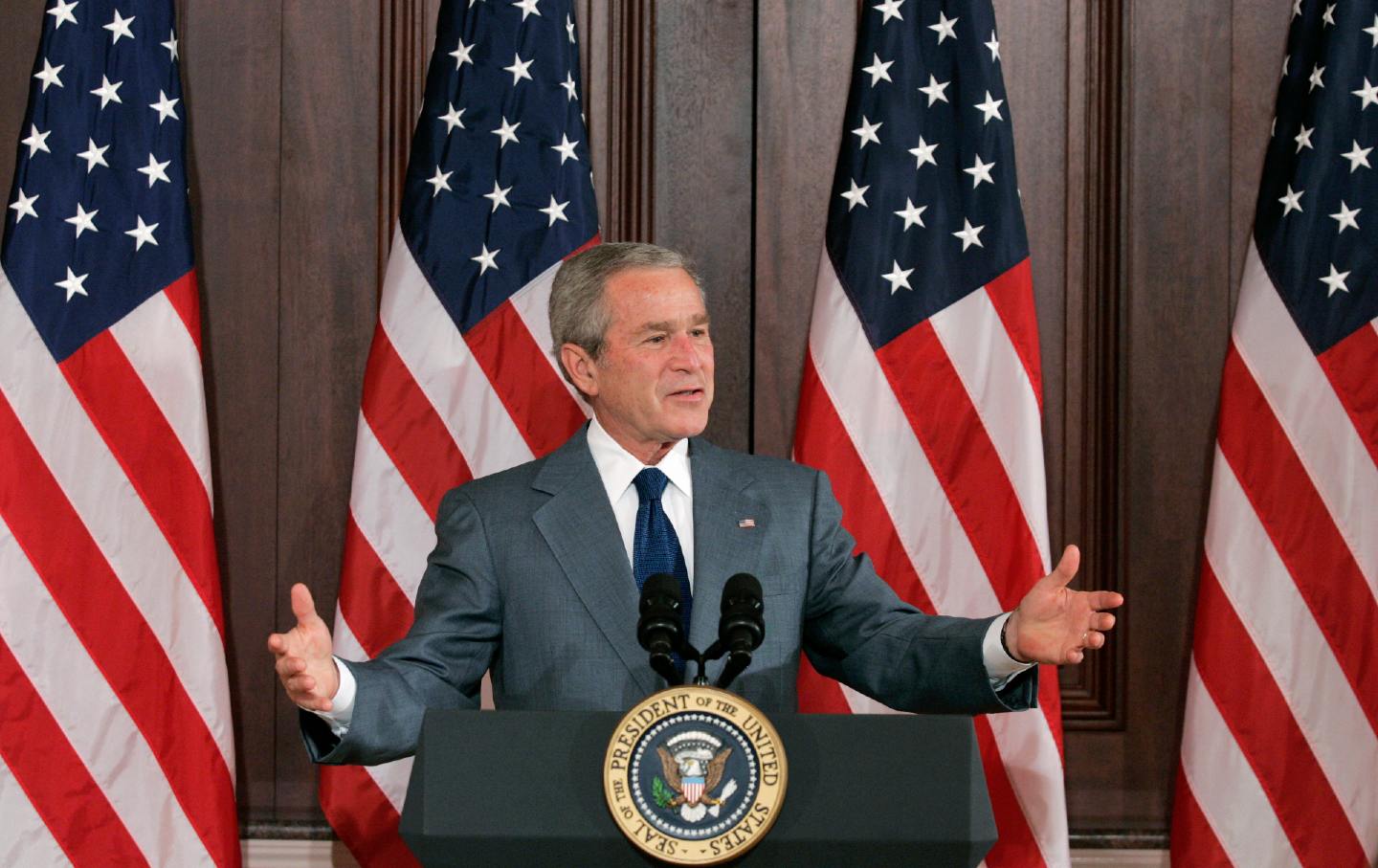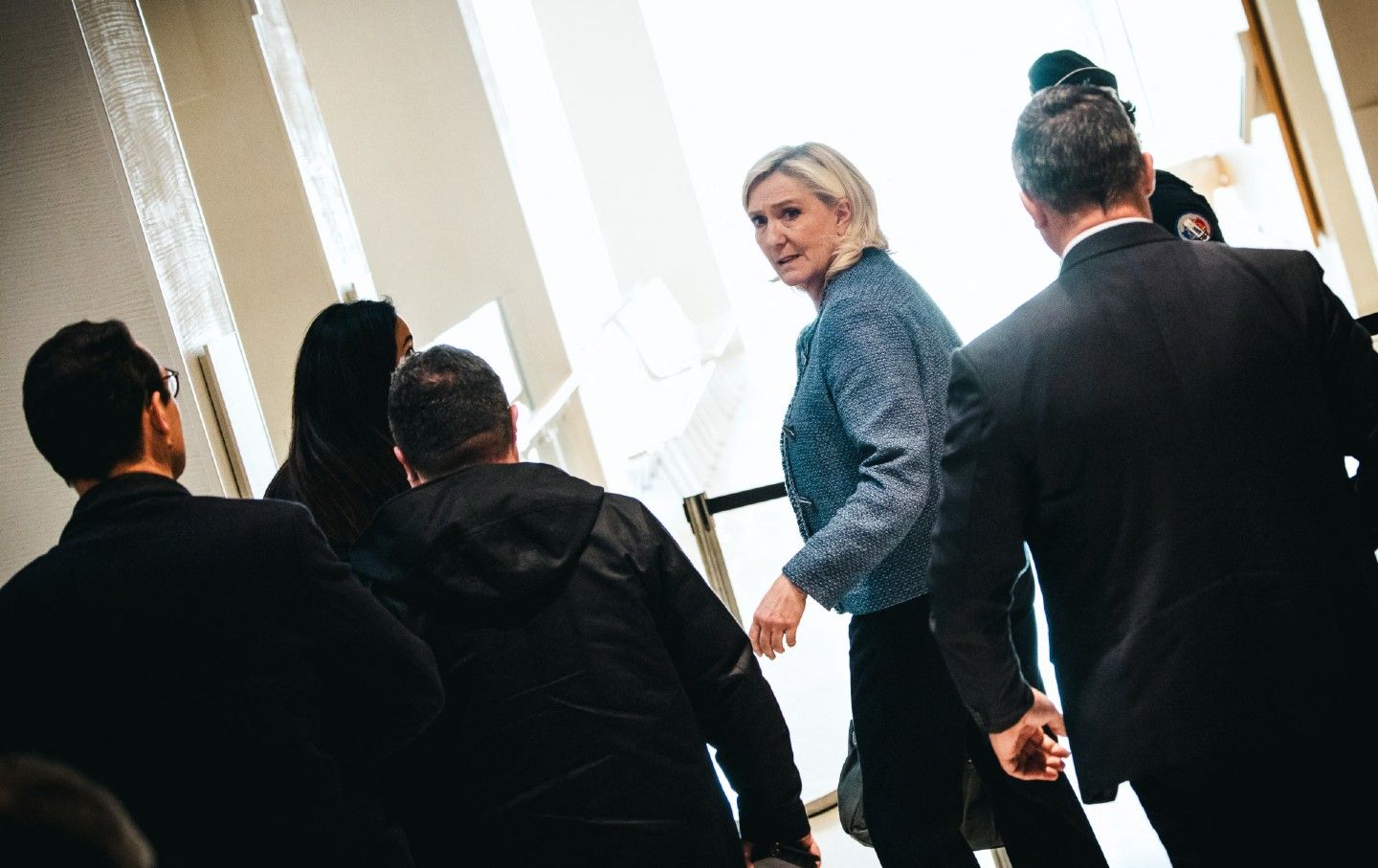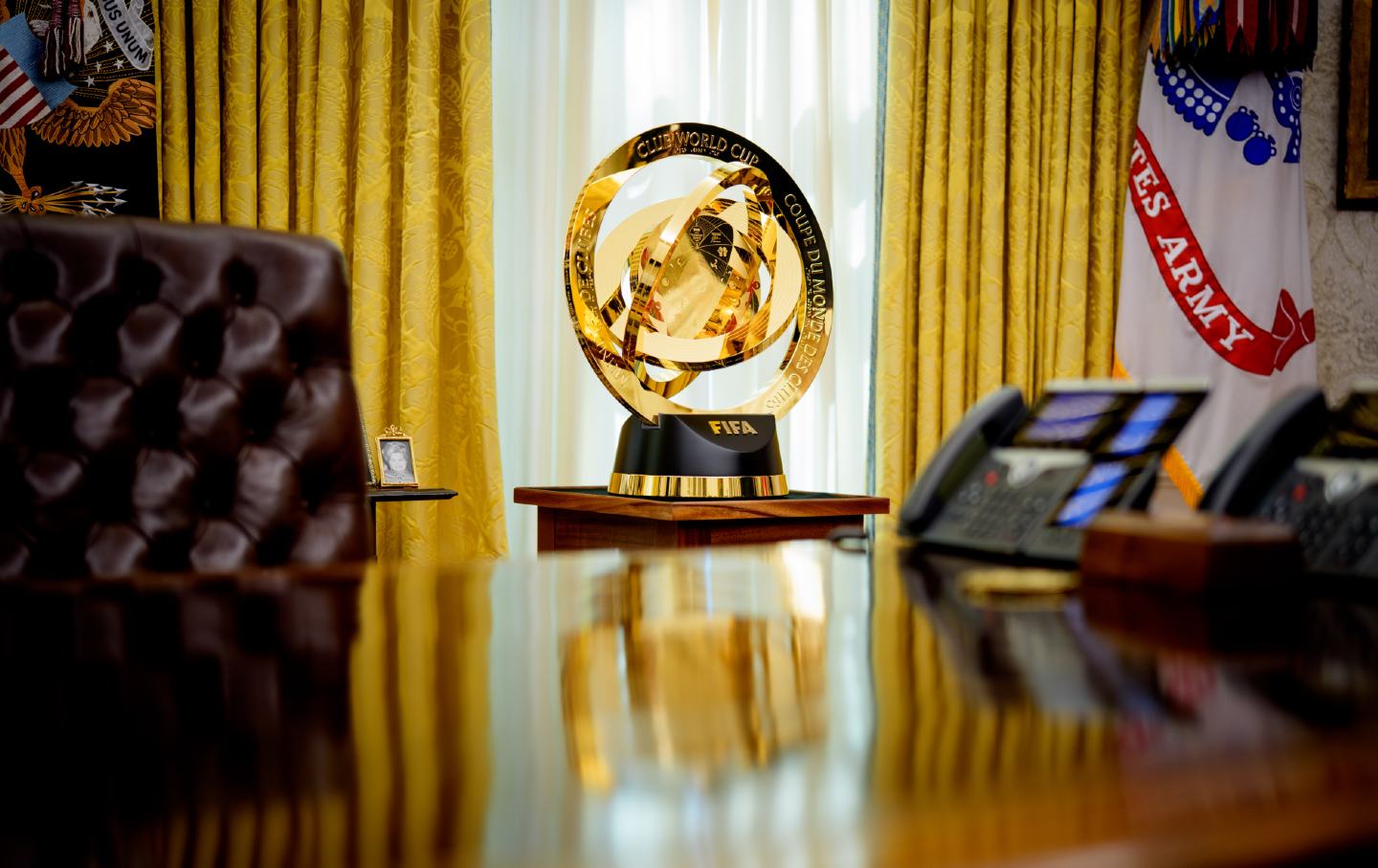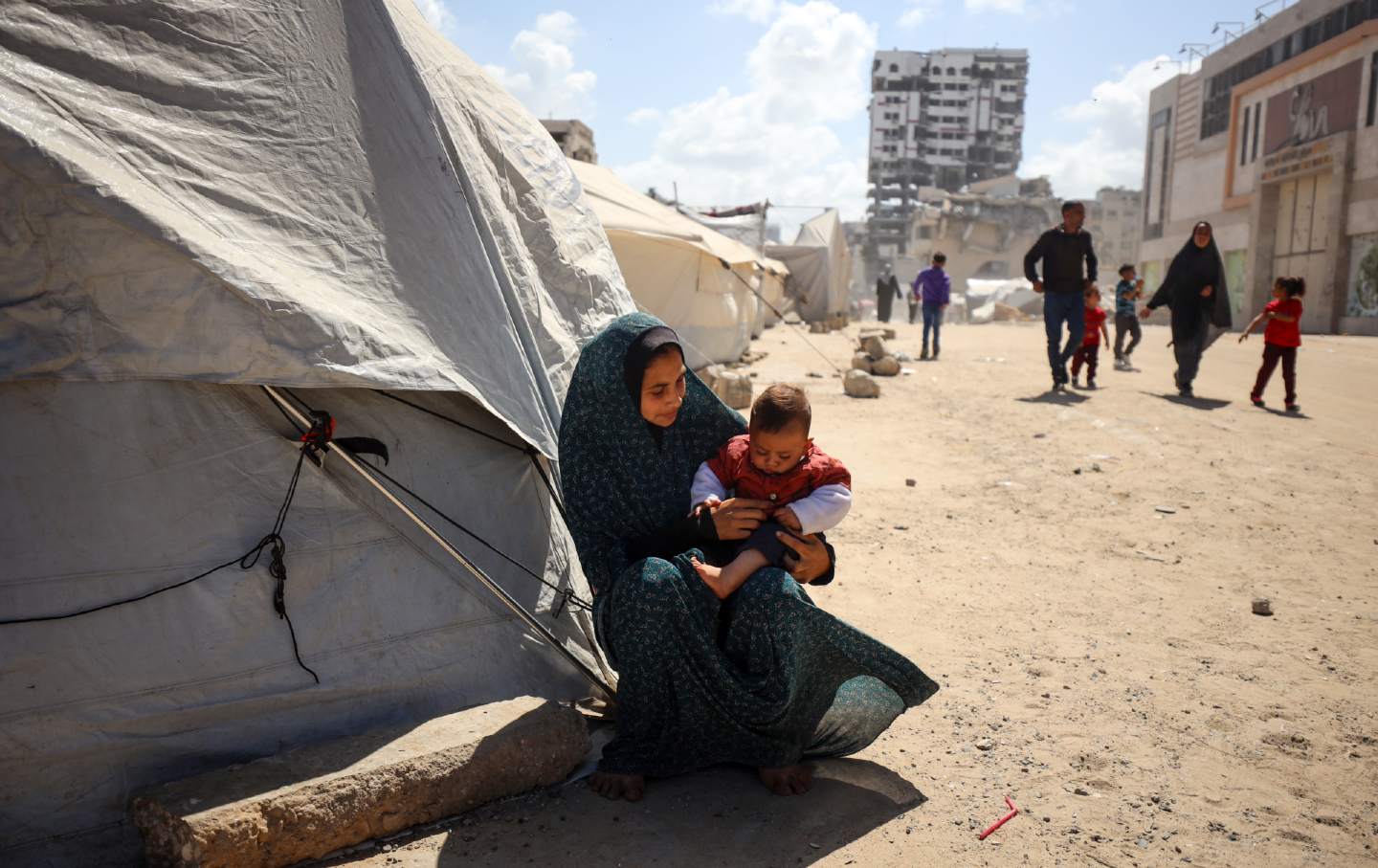The Occupation and Reoccupation of Sciences Po
Paris has felt surprisingly apolitical these last few months. But something changed: Students occupied one of France’s most elite universities.
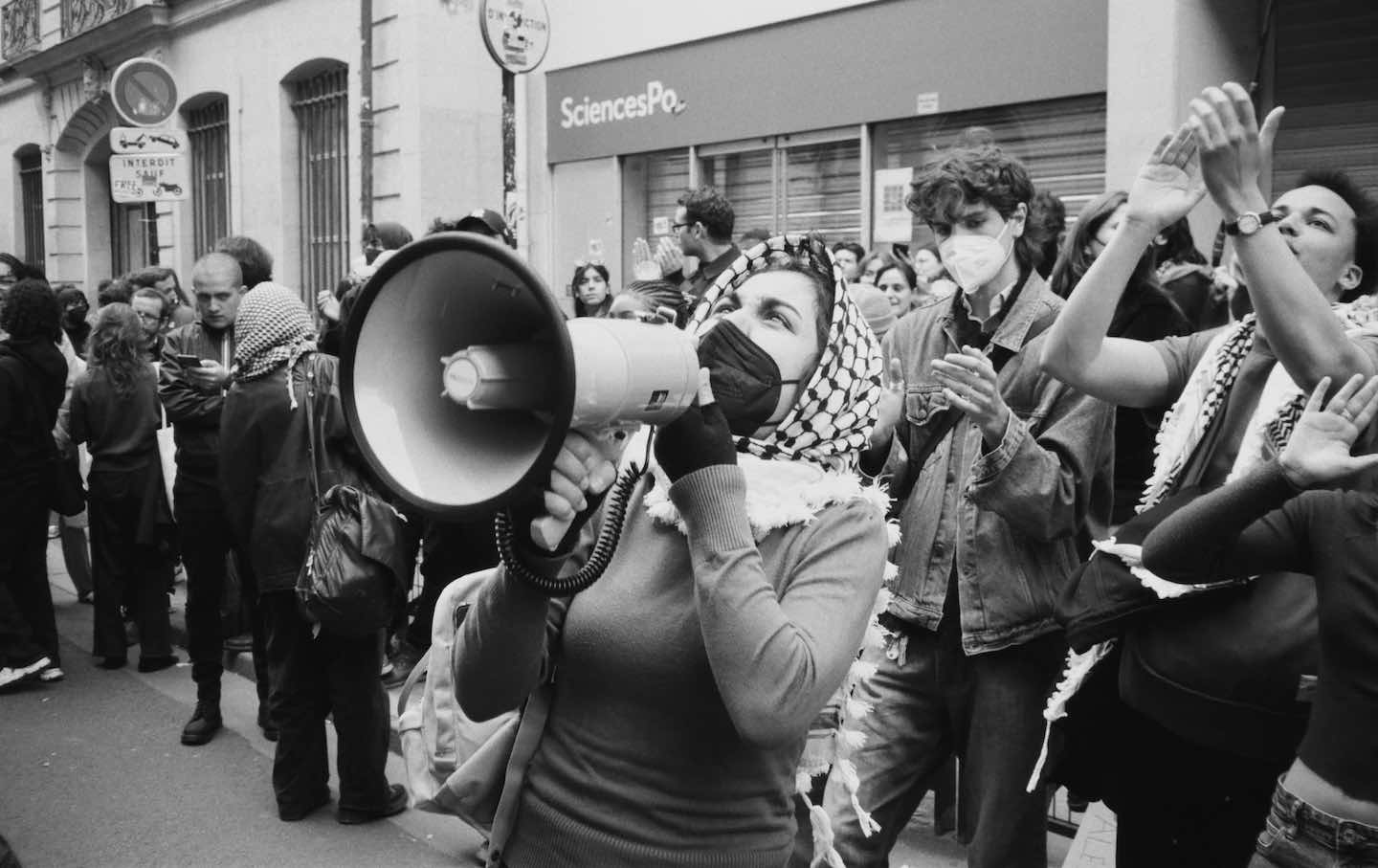
A student leads a chant on the street in front of Sciences Po on April 26.
(Nicolas Niarchos)Paris—Last Thursday night, at one end of the Rue St.-Guillaume, a trio of students, their faces wrapped in keffiyehs, plastic tubs of takeout in their hands, nervously stood sentry. One of them, who declined to give her name, told me that Sciences Po, an elite university known for its political science and economics faculties, was being occupied by its students. There were two groups of students watching for the police, or counterprotesters, at each end of the street. “They sent the police in to break the occupation last night,” she said. It had been the first use of police force to break a student protest in Sciences Po history. “But now we have reoccupied.”
Students around the world are taking over campuses to protest the Israeli assault on Gaza, which has killed at least 30,000 Palestinians, following the killings of more than 1,200 Israelis on October 7. Paris, which has seen protests like anywhere else in the world, with activists rallying in solidarity with Israel and Palestine, has at times felt surprisingly apolitical these last few months. I live close to the Rue St.-Guillaume, and have seen the walls around Sciences Po blossom with flyers demanding the return of Israeli hostages and Free Palestine graffiti—but also with anti-Iranian banners and posters demanding the decolonization of Africa. I have documented several protests there since October 7. They have usually been brief and have numbered not more than a few dozen students. But last week, something seemed to change.
There had been stirrings in March, when a student action group called the Palestine Committee seized a lecture hall and “rebaptized” it “Gaza.” What happened next was the subject of some debate, and it briefly seemed to dampen protests at the school: A member of a Jewish student group alleged that she was not allowed to enter a debate because of her pro-Israel stance.
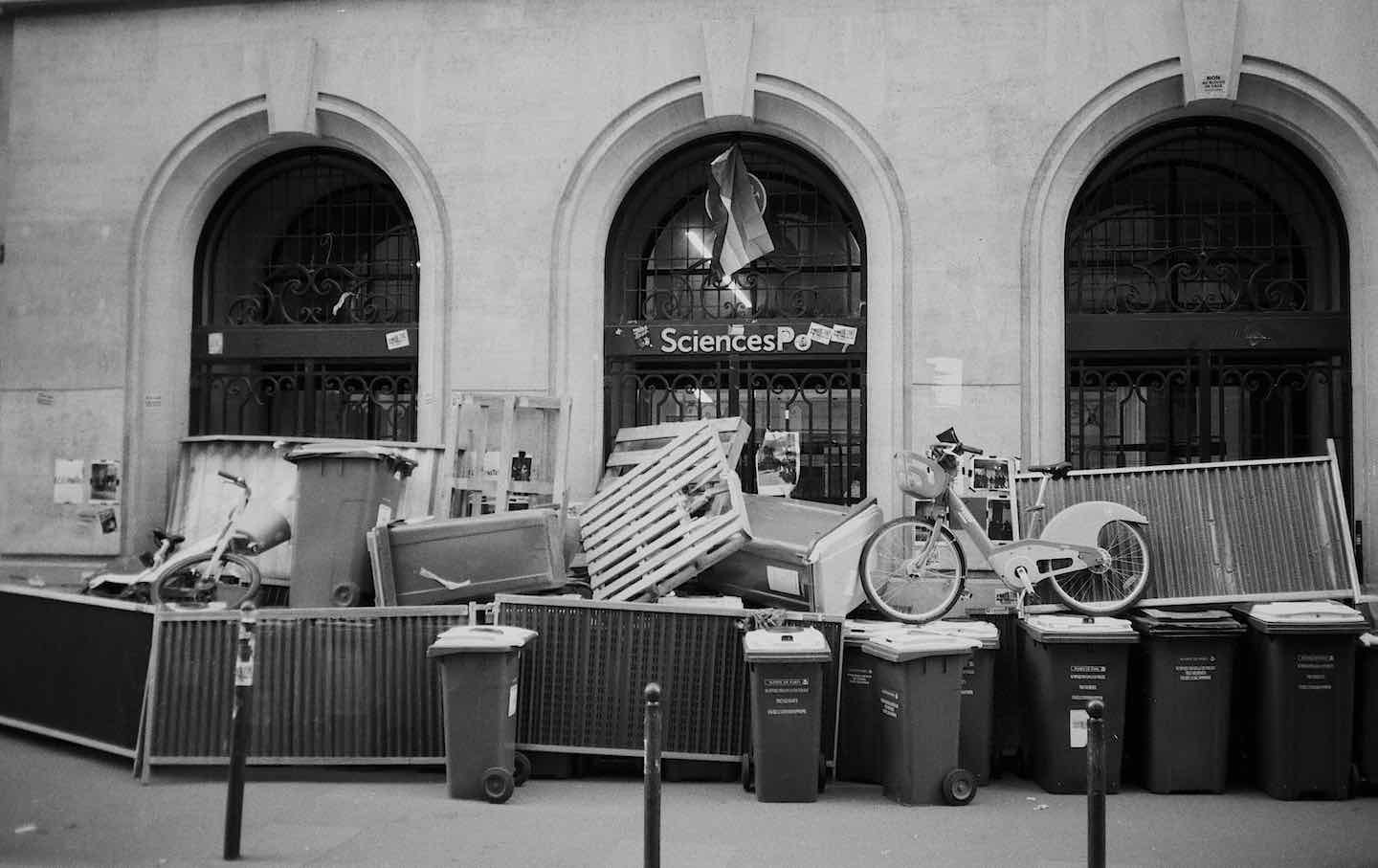
The highest level of French politics professed itself shocked. Gabriel Attal, the prime minister, and Sylvie Retailleau, the education minister, called a meeting with Sciences Po’s board. “I will never let a French university become the mouthpiece for a North American ideology which, under the guise of modernity, promotes intolerance, rejects debate, and curbs freedom of expression,” Attal, who is a Sciences Po alum, told France’s parliament. Sciences Po has particularly close connections with the French political class—President Emmanuel Macron holds a masters from the school.
It turned out that Attal had rushed to conclusions: The student was the only member of a Jewish student group who was not allowed in, and she was reportedly not allowed because she was harassing other students. Sciences Po professors wrote an open letter to the government condemning meddling with academic freedoms and decrying intolerance on all sides.
Wednesday’s action was an “escalation,” as Louise, a 22-year-old student coordinator for Sciences Po’s Palestine Committee, put it. The student groups were demanding that the university condemn Israel and sever ties with Israeli universities, with which it offered joint degree programs. “May I remind your readers that there are no universities left in Gaza? They have all been razed to the ground,” Louise told me. “This is unacceptable. And this is why we’re here today.” (Students I spoke to refused to give their last names because they worried they would be “targeted by the far right.”)
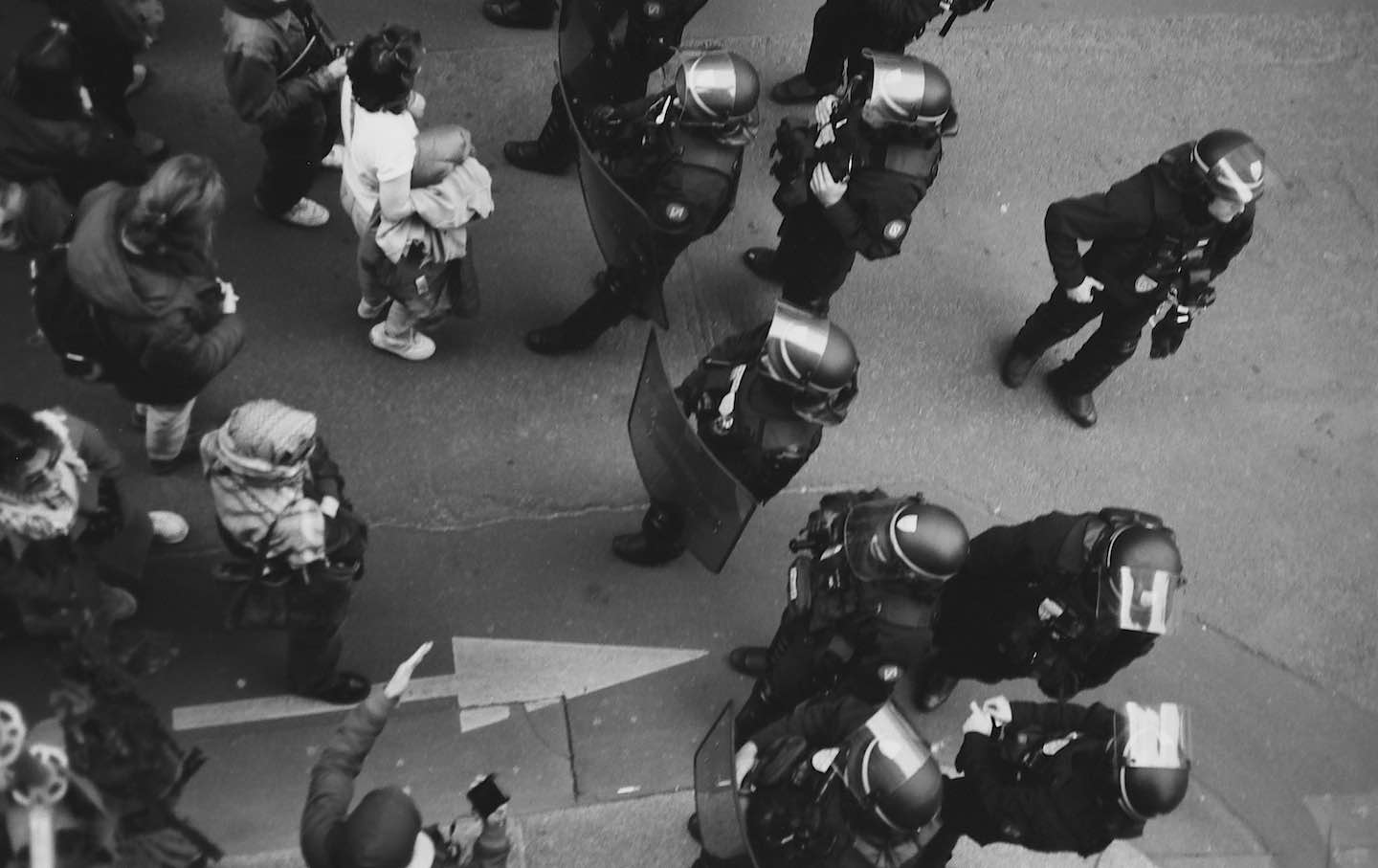
“We were definitely inspired by what is happening at Columbia, at Yale, and at Harvard,” she said, referencing the Gaza solidarity encampments at US universities. Around 50 percent of students at Sciences Po are from outside of France. “The students here are more sensibilized, because there are a lot of internationals here,” said Laurent, a mustachioed 65-year-old retired teacher who had joined the protest. “This is a breath of fresh air.”
Eduardo, a 23-year old masters’ student from Argentina, told me that he thought Sciences Po stifles protest more than universities in Latin American countries. “Criticism has been suppressed,” he said.
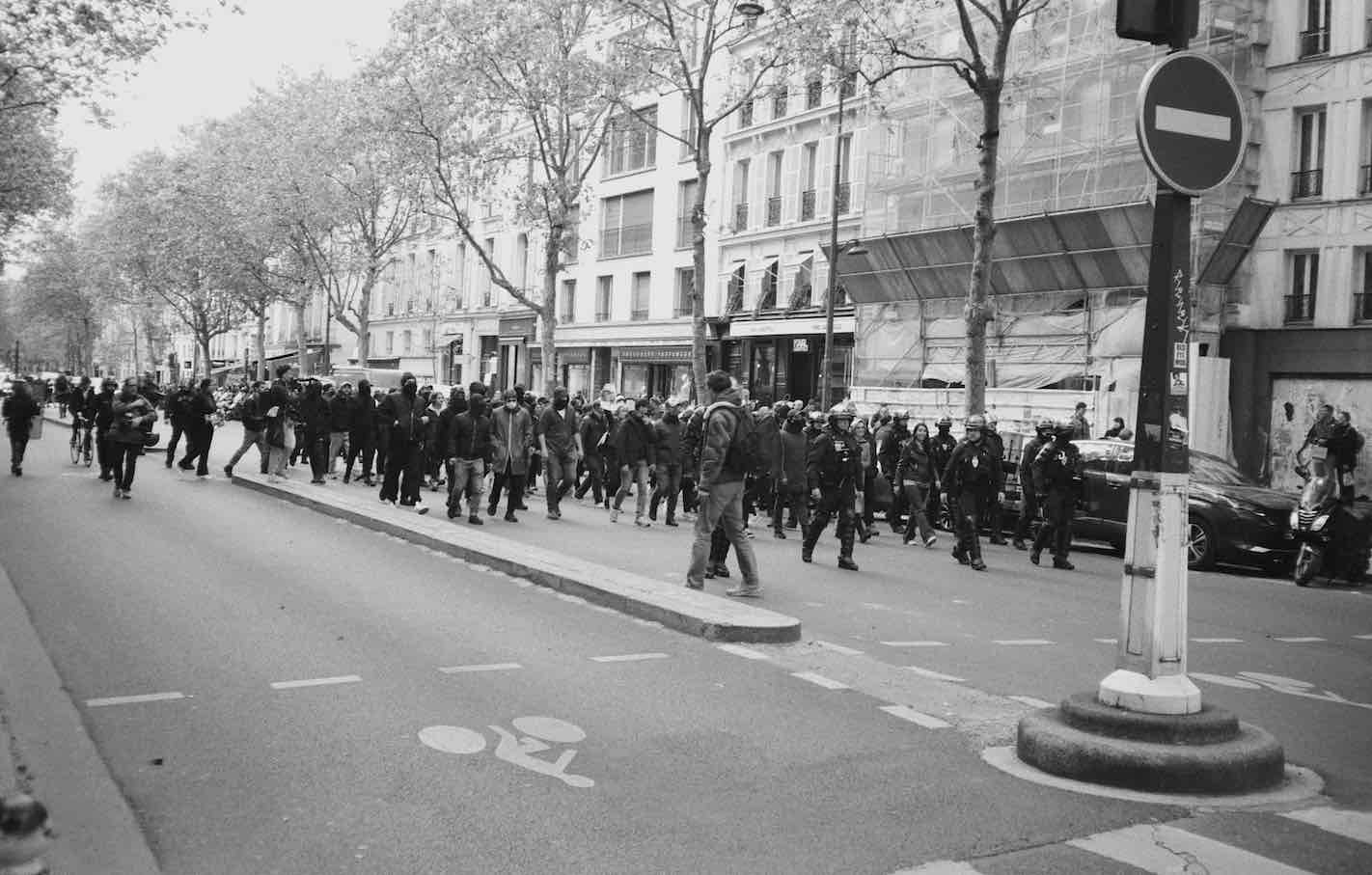
The Wednesday occupation was brief. It began in the mid-afternoon with a sit-in of around 60 students. (The Palestine Committee numbers around 100 students, the group says.) The university, led by an interim administration under Jean Bassères, decided to crack down. (The university’s president was dismissed in March after he was referred to a criminal court for domestic battery.) At around 12:50 am on Thursday, members of the Compagnies Républicaines de Sécurité (CRS), a riot-busting wing of the French police, pulled them out of the campus as they, by all accounts, were kicking and screaming “Free Palestine.”
The crackdown galvanized the protesters. By Thursday evening, the students were back on campus, hanging out of the windows, chanting “We are all the children of Gaza” until the early hours. They slept in the classrooms. Just before seven, the noise of voices—“We are here to stay, we won’t move”—rose with the dawn along the street. It was trash day, and during the night students had piled plastic trash bins—including one from my building—along with electric bikes, bits of wood, and metal barriers in front of the university doors. The barricades were up. A small group of students sat in the road, occasionally sending up supplies to their comrades in shopping bags pulled up by a daisy-chain of knotted-together keffiyehs.
By midday, the crowd had swollen. Someone had taped a series of demands to the front of the university, a “95 Theses” for the Gaza age, if you will: “We demand that Sciences Po mobilize in defense of the rights of Palestinians, take a position, and break its partnerships with complicit Israeli universities, as it did with Russian universities at the moment of the invasion of Ukraine.” The police had arrived, positioning patrol cars at each end of the Rue St.-Guillaume. “All I can tell you is that there’s a protest by the students of Sciences Po,” one of the officers told me. “Go and ask them what happens next.”
The windows at the front of the university opened, and a student in a face-mask addressed the crowd in British-accented English. The Palestine Committee was negotiating with the administration, he said. He had little faith that the negotiations would succeed. “It’s very hard,” he said. “We have to sleep on wooden floors.” He asked for deodorant and toothpaste—the students already had lots of food.
Popular
“swipe left below to view more authors”Swipe →By the mid-afternoon, the barricades had been dismantled, but the school remained closed. Perhaps a thousand people had massed. The CRS had gathered at the end of the street. The security guards shrugged when I asked them when they thought the protest would end. I asked Eduardo, who had come to the protest sporting a new keffiyeh (“I bought it for ten euros”), what would happen to the Israeli students who were currently studying at Sciences Po if all ties were broken. “They should stay here and continue studying,” he said. “It’s not their fault.”
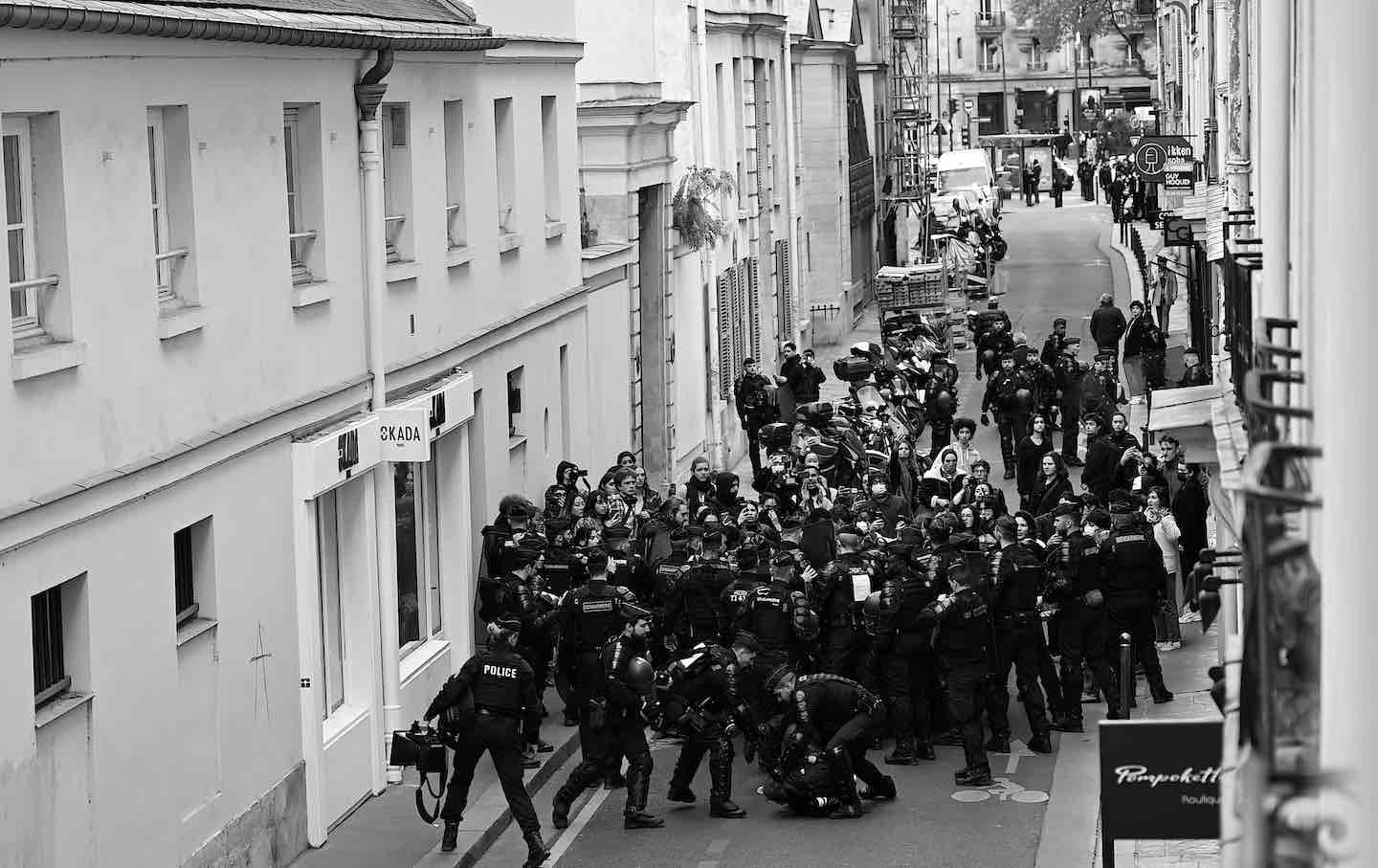
The French right has seized on the movement at Sciences Po as “virulent wokeism,” “hysteria,” and, most importantly, a loincloth for antisemitism. On Saturday, Attal called it a “shocking spectacle” caused by “a virulent minority.” On the front page of Saturday’s edition of the center-right newspaper Le Figaro, Yves Thréard criticized the French left, and especially Jean-Luc Mélenchon, who called the students “the honor of the country.” “For this ‘engineer of chaos,’ this Islamo-leftist mold is a godsend as he looks for new constituencies,” Thréard wrote. “Sciences Po is a drunken boat, for years it has been at the mercy of all the winds of identitarian contestation, decolonialism, intersectionality, anti-capitalism.”
According to the centrist paper Le Monde, the university has taken steps to stop antisemitism: Late last year, a student who had been posting antisemitic messages online was referred to the authorities by the university, and four others were disciplined for comments made on Whatsapp. I asked Eduardo whether he had seen antisemitism on campus. “This narrative is absolutely not true,” he said. “You have many Jewish students here.” In the crowd, a few students walked around holding posters that read “I am Jewish, and I want a ceasefire,” high-fiving other students in keffiyehs.
Toward the end of the afternoon, a group of masked counterprotesters gathered under an Israeli flag at the intersection with the Boulevard Saint-Germain. The CRS, who now seemed to outnumber the protesters, pushed the two groups apart, leading the pro-Israel group down the boulevard, where they briefly blocked traffic. “Our objective is to get them out of the boulevard and onto the sidewalk,” a CRS commandant said. A group of tourists with US accents sitting at the historic Café de Flore stood to salute them.
Just past Les Deux Magots, another “literary” café where tourists queue for $10 cappuccinos, a man waving a Palestinian flag began shouting at them and the CRS pushed him away. “Terrorist!” the pro-Israelis shouted. One of the protesters, who also only wanted to be identified by his first name, Eric, reserved some choice words for journalists before telling me, “I’m here for kids who are stuck in tunnels deep in the Middle East.” The police then insisted that Eric and his group of protesters descend into the metro. “And don’t come back,” the commandant said.
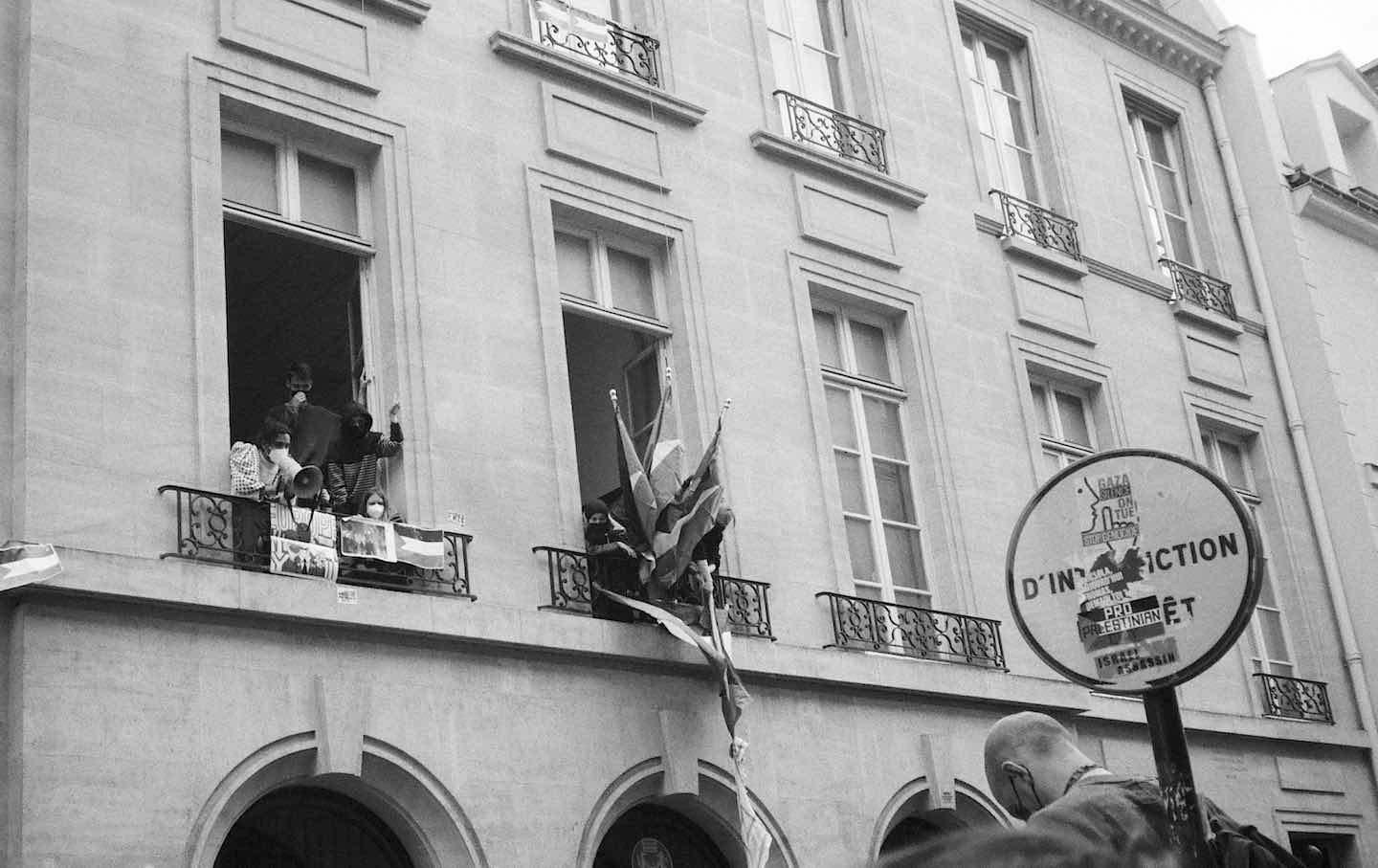
Back at Sciences Po, the police were slowly pushing groups of protesters down the streets. A dark-haired woman threw pink peony petals on the protesters from a balcony. The students continued to make speeches. “Their tactic is to wear us down,” the British-accented organizer said from the window. “We’re staying here, we won’t move.”
A bit after dinner, the noise quieted down. A light rain had begun to fall. The university and the Palestine Committee had agreed to dialogue this week. Groups of students chanted “Free Palestine” as they were led by the CRS out of the building and past my window. “Do you think they’ll be back tomorrow?” a CRS officer wondered, taking off his helmet. His colleague shrugged.
It is almost May in Paris, the time of the year when memories of 1968 hang in the air. “Who knows, this could be the start of something, but then again, I always get these things wrong,” Laurent, the teacher, had told me.
By midnight, the only noise on the Rue St.-Guillaume was a party of 40-somethings at Le Basile, the bar on the corner, belting out tunes by Céline Dion.

